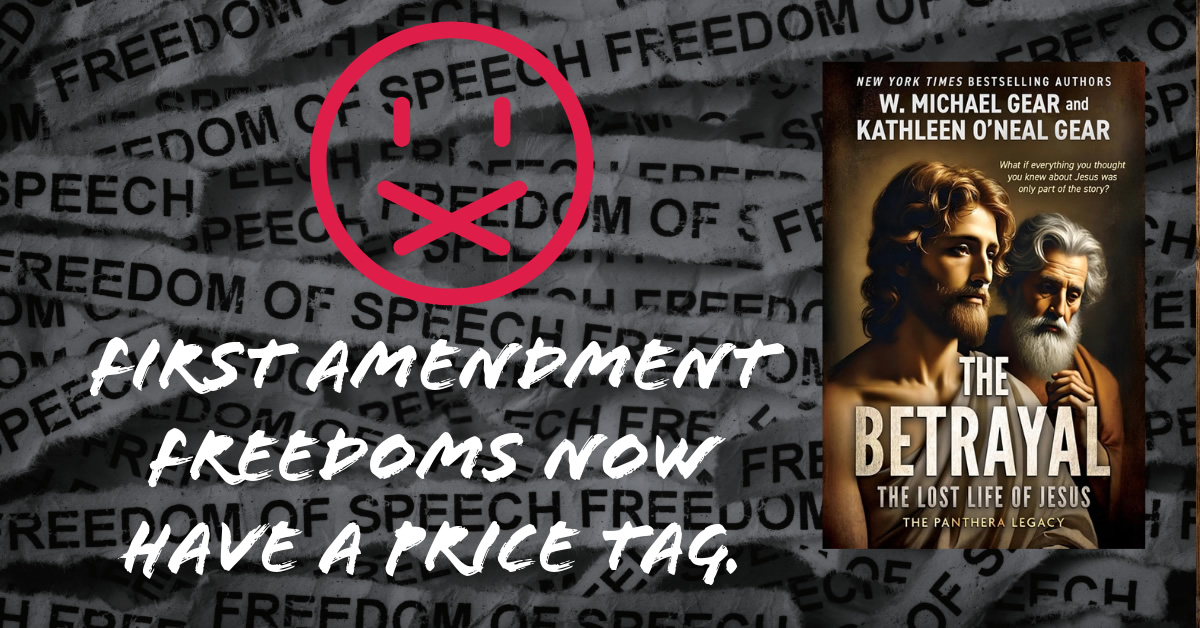Greetings! This is going to be a somewhat unusual newsletter, because we want to have a serious discussion with you about censorship.
You see, our book THE BETRAYAL was just banned.
French historian Michel Foucault, known for his sobering work on surveillance, said in an interview in 1994, “My point is not that everything is bad, but that everything is dangerous” (Bernstein, 1994, p. 226).
The question in today’s social media environment is who determines what is dangerous? We ask that question because we were just informed that our publisher’s book ad for the upcoming July 28th reprint of The Betrayal was blocked on the social media platform Reddit.
Don’t forget, social media is a business. Big business. Platforms earn billions in income from advertisers.
Why is that important? Algorithmic censorship is rampant these days, but it’s getting worse. Corporate control of online speech, undertaken through automated filtering software, is growing and intensifying, restricting more and more speech that it deems inappropriate. We are not referring here to pornography or hate speech. There are laws that enforce bans against that kind of speech, and should. Instead, we are talking about speech that is flagged by an algorithm as being unprofitable to the platform’s advertisers.
In her excellent article, “From brand safety to suitability: advertisers in platform governance’, in: Transnational Legal Theory, 14/1 (2023a), pp. 46-89, Rachel Griffin points out that advertisers do not want to run ads alongside content they consider controversial or offensive, which is anything that could create negative associations with their brands.
For example, platforms’ policies on inappropriate speech are often determined by algorithms that use industry-standard metrics of “toxicity.” Toxicity, interestingly, is not a legal definition of hate speech, but any speech likely to make people leave a conversation. (Talat, 2021). Platforms call that engagement. Engagement is a measure of how actively people interact with a post on Facebook, Instagram, Reddit, or similar platforms. Advertisers want people to engage with posts that increase their profit margins. They don’t want engagement with posts that do not.
If an algorithm determines that a post is potentially offensive to the customers of the advertisers, it’s banned in one fashion or another.
An author could be blacklisted and all of their titles or music outright banned or the content might be shadowbanned. Shadowbanning is when the platform refuses to distribute posts, effectively suppressing the freedom of speech or expression because no one ever sees the post. In the past this practice has targeted the shooting sports, Black music, LGBTQIA and feminist literature, renowned ancient artists like Phidias (arguably the finest sculptor of the ancient world), and other forms of artistic expression. A good reference for such cases is Music and the Politics of Censorship: From the Fascist Era to the Digital Age, edited by James Garratt, Turnhout, Belgium, Brepols, 2025.
How do the platforms restrict the freedom of speech and expression? There are two basic tools: Hash-matching and fingerprinting systems.
Meta’s Media Matching Service is a tool that stores hash codes for content that was removed. Hash-matching magnifies the effect by scaling up the ban across not only its own platform but other platforms, so that any content removed by one platform is automatically tagged and banned across all other participating platforms. For example, OpenAI’s GPT series (e.g. ChatGPT) uses examples of text that was previously labeled as offensive by moderators to detect different variations of the text (Nicholas & Bhatia 2023) and remove them. Once content is flagged through automated content classifications—for example, banning a book ad—the ban spreads.
Bans are often not about content. They’re about money. Companies like Meta, Google, and Apple want to make a profit, which means the algorithmic tools they develop reflect the commercial priorities of the company. Simply put, that means that First Amendment freedoms now have a price tag. Is the speech profitable for advertisers? If not, it’s banned. Apparently, The Betrayal has been tagged as a threat.
As those of you who’ve already read The Betrayal know, it presents an alternate story of the life of Jesus based upon the archaeological and historical record. It’s our only footnoted novel. We footnoted the events specifically so that our readers could go directly to the resources, read the information themselves, and make their own decisions. That’s how good science works. It’s also how good history works.
Who could have ever seen this threat to the freedom of speech and expression coming?
If Michel Foucault were alive today, we suspect he would alter his observation to say, “Everything is dangerous to some advertiser somewhere.”
We would like to thank all of you who have already read The Betrayal. In the future, others may not have the chance.
Best Regards.
Michael and Kathleen
The Betrayal is availabe in the following formats:
Paperback: https://www.amazon.com/Betrayal-Lost-Jesus-Panthera-Legacy/dp/1639775765
Kindle: https://www.amazon.com/Betrayal-Lost-Jesus-Panthera-Legacy-ebook/dp/B0FDYD51DM

